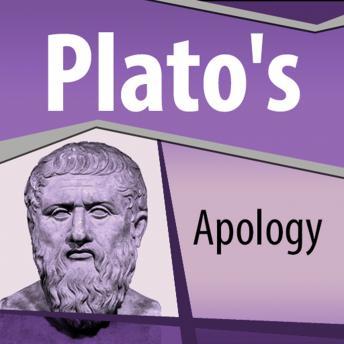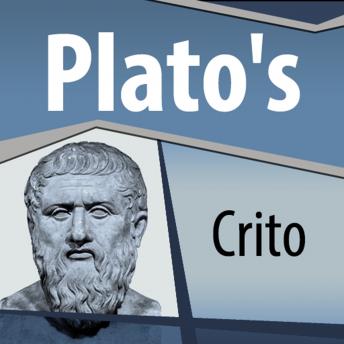Searching for: "Plato"
-
Phaedo is one of the dialogues written by the ancient Greek philosopher Plato. It is a philosophical exploration of the nature of the soul, the afterlife, and the concept of knowledge. The dialogue is set on the day of Socrates' execution, and it recounts the conversation between Socrates and his followers, including Phaedo, about his impending death and their beliefs about the soul. Throughout the dialogue, Socrates argues that the soul is immortal and that the pursuit of knowledge is the key to achieving true wisdom. He uses a variety of analogies, including the idea of the soul being like a prisoner trapped in the body, to illustrate his points. Socrates also discusses the theory of...read more
-
Cratylus, written by the ancient Greek philosopher Plato, is an exploration of the nature of language and its relationship to reality. In this dialogue, Plato engages in a discourse with two interlocutors, Hermogenes and Cratylus, about the distinction between conventional and natural languages. Through this discussion, Plato suggests that language is an expression of knowledge which can be used to understand reality. Read in English,...read more
-
'What is at stake is far from insignificant: it is how one should live one's life.' Plato's The Republic is widely acknowledged as the cornerstone of Western philosophy. Presented in the form of a dialogue between Socrates and three different interlocutors, it is an inquiry into the notion of a perfect community and the ideal individual within it. During the conversation, other questions are raised: What is goodness? What is reality? What is knowledge? The Republic also addresses the purpose of education and the roles of both women and men as 'guardians' of the people. With remarkable lucidity and deft use of allegory, Plato arrives at a depiction of a state bound by harmony and ruled by...read more
-
The Apology of Socrates is one of the earliest existing documents of Greek philosophy - everything earlier was lost and is known only through quoted fragments in later works, like those of Plato himself. Rightly so, the Apology is still, all by itself, an excellent introduction to Western philosophy and traditionally the first complete text read in the formal study of Classical Greek. Although the meaning has changed through time, the Greek word apología simply and precisely meant a defense, or a defense speech. At the trial for his life in 399 BC, Socrates astonished his listeners by appearing, despite his vigorous "Defense Speech", to deliberately get himself found guilty and...read more
-
Long regarded as the most accurate rendering of Plato's Republic that has yet been published, this widely acclaimed work is the first strictly literal translation of a timeless classic. This second edition includes a new introduction by Professor Bloom, whose careful translation and interpretation of The Republic was first published in 1968. In addition to the corrected text itself there is also a rich and valuable essay-as well as indexes-which will better enable the reader to approach the heart of Plato's...read more
-
In Euthyphro, Socrates is on his way to the court, where he must defend himself against serious charges brought by religious and political authorities. On the way he meets Euthyphro, an expert on religious matters who has come to prosecute his own father. Socrates questions Euthyphro's claim that religion serves as the basis for ethics. Euthyphro is not able to provide satisfactory answers to Socrates' questions, but their dialogue leaves us with the challenge of making a reasonable connection between ethics and religion. © Agora...read more
-
Socrates is on trial for his life. He is charged with impiety and corrupting young people. He presents his own defense, explaining why he has devoted his life to challenging the most powerful and important people in the Greek world. The reason is that rich and famous politicians, priests, poets, and a host of others pretend to know what is good, true, holy, and beautiful, but when Socrates questions them, they are shown to be foolish rather than wise. © Agora...read more
-
The Athenian court has found Socrates guilty and sentenced him to death. While he is waiting to be executed, his friend, Crito, comes to the prison to persuade him to escape and go into exile. Socrates responds by examining the essence of law and community, probing the various kinds of law and making distinctions that go far beyond the particular issue of whether or not Socrates should escape. © Agora...read more
-
Socrates is in prison, sentenced to die when the sun sets. In this final conversation, he asks what will become of him once he drinks the poison prescribed for his execution. Socrates and his friends examine several arguments designed to prove that the soul is immortal. This quest leads him to the broader topic of the nature of mind and its connection not only to human existence but also to the cosmos itself. What could be a better way to pass the time between now and the sunset? © Agora...read more
-
Gorgias of Leontini, a famous teacher of rhetoric, has come to Athens to recruit students, promising to teach them how to become leaders in politics and business. A group has gathered at Callicles' house to hear Gorgias demonstrate the power of his art. This dialogue blends comic and serious discussion of the best life, providing a penetrating examination of ethics. Is it better to suffer evil or to do evil? Is it better to do something wrong and avoid being caught or to be caught and punished? Is pleasure the same as goodness? As the characters in the dialogue pursue these questions, the foundations of ethics and the nature of the good life come to light. © Agora...read more
-
Socrates questions Ion, an actor who just won a major prize, about his ability to interpret the epic poetry of Homer. How does an actor, a poet, or any other artist create? Is it by knowing? Is it by inspiration? As the dialogue proceeds, the nature of human creativity emerges as a mysterious process and an unsolved puzzle. © Agora...read more
-
A dialogue between Socrates and Meno probes the subject of ethics. Can goodness be taught? If it can, then we should be able to find teachers capable of instructing others about what is good and bad, right and wrong, or just and unjust. Socrates and Meno are unable to identify teachers of ethics, and we are left wondering how such knowledge could be acquired. To answer that puzzle, Socrates questions one of Meno's servants in an attempt to show that we know fundamental ideas by recollecting them. © Agora...read more
-
The Republic poses questions that endure: What is justice? What form of community fosters the best possible life for human beings? What is the nature and destiny of the soul? What form of education provides the best leaders for a good republic? What are the various forms of poetry and the other arts, and which ones should be fostered and which ones should be discouraged? How does knowing differ from believing? Several characters in the dialogue present a variety of tempting answers to those questions. Cephalus, Polemarchus, Thrasymachus, and Glaucon all offer definitions of justice. Socrates, Glaucon, and Adeimantus explore five different forms of republic and evaluate the merits of...read more
-
Plato's Phaedo is one of the great dialogues of his middle period, along with the Republic and the Symposium. The Phaedo, which depicts the death of Socrates, is also Plato's seventh and last dialogue to detail the philosopher's final days (the first six being Theaetetus, Euthyphro, Sophist, Statesman, Apology, and Crito). In the dialogue, Socrates discusses the nature of the afterlife on his last day before being executed by drinking hemlock. Socrates has been imprisoned and sentenced to death by an Athenian jury for not believing in the gods of the state and for corrupting the youth of the city. The dialogue is told from the perspective of one of Socrates' students, Phaedo of Elis. Having...read more
-
Become familiar with the most important ancient philosophers, those who shaped Western philosophy. Delve deep into their works and thoughts with a selection of the essential quotes introducing their major ideas and delineating the structure of their work with...read more
-
The Allegory of the Cave appears in Plato's Republic and compares the effect of education and the lack of it on human nature. It is written as a dialogue between Plato's brother and Socrates, who tells of people that have been chained to the wall of a cave their whole lives. They see shadows projected on the wall from objects passing in front of a fire behind them. Socrates explains that the philosopher is like a prisoner who has escaped the cave and realizes that the shadows on the wall are not the true reality at...read more
-
The Republic poses questions that endure: What is justice? What form of community fosters the best possible life for human beings? What is the nature and destiny of the soul? What form of education provides the best leaders for a good republic? What are the various forms of poetry and the other arts, and which ones should be fostered and which ones should be discouraged? How does knowing differ from believing? Several characters in the dialogue present a variety of tempting answers to those questions. Cephalus, Polemarchus, Thrasymachus, and Glaucon all offer definitions of justice. Socrates, Glaucon, and Adeimantus explore five different forms of republic and evaluate the merit of each...read more
-
From Book IV of the Republic. Plato's description of the effects of knowledge and how it is to be gained. It is written as a dialogue between Plato's brother Glaucon and...read more
-
01. F.Scott Fitzgerald - The Curious Case of Benjamin Button 02. O.Henry - The Gift of the Magi 03. Mark Twain - On The Decay of the Art of Lying 04. Sun Tzu - The Art of War 05. E.A. Poe - The Raven 06. Kahlil Gibran - The Madman 07. W.W. Jacobs - The Monkey's Paw 08. Anonymous - Aladdin 09. The Founding Fathers - The Declaration of Independence 10. Plato - The Apology of Socrates 11. Lord Alfred Tennyson - Charge of the Light Brigade 12. T.S. Eliot - The Waste Land 13. William Dean Howells - Wild Flowers of the Asphalt 14. Karl Marx and Friedrich Engels - The Communist Manifesto 15. E.A. Poe - The Pit and the Pendulum 16. F. Scott Fitzgerald - The Offshore Pirate 17. Leo...read more




















